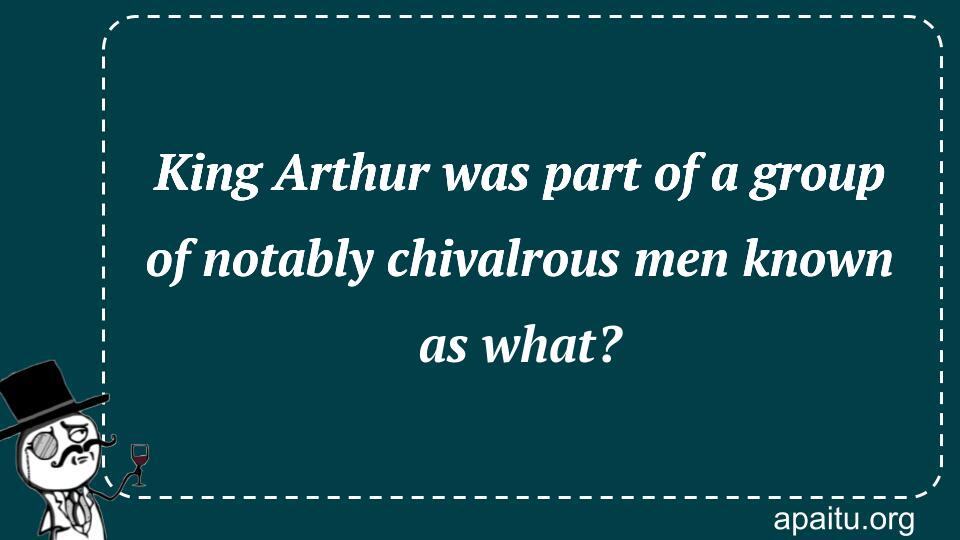Question
Here is the question : KING ARTHUR WAS PART OF A GROUP OF NOTABLY CHIVALROUS MEN KNOWN AS WHAT?
Option
Here is the option for the question :
- The Circle of Five
- The Nine Worthies
- The Twelve Angry Men
- The Nine Old Men
The Answer:
And, the answer for the the question is :
Explanation:
The Nine Worthies were a collection of men that mediaeval scholars believed exemplified the ideal attributes of men in chivalry, duty towards God, and service towards country. King Arthur was frequently mentioned as being a member of this group. Three individuals who identified as Christians, three men who identified as Jews, and three men who identified as heathen made up the Nine Worthies. It was considered that ruler Arthur was the best example of a Christian ruler since he prioritised religion, honour, and justice above all else. He was one of the three Christian Worthies. Other historical figures such as Julius Caesar, Alexander the Great, and King David were also considered to be among the Nine Worthies.

King Arthur, the legendary figure of British folklore, was not only a renowned king but also a member of a distinguished group of chivalrous men known as The Nine Worthies. This exclusive assembly consisted of three figures from each of the three great epochs of history: pagan, Jewish, and Christian. The Nine Worthies were considered paragons of knightly virtues and served as role models for medieval knights and nobles.
The first trio of The Nine Worthies represented the pagan era. They were Hector of Troy, Alexander the Great, and Julius Caesar. Hector, the valiant warrior of the Trojan War, exemplified courage and loyalty. Alexander the Great, the Macedonian king who conquered vast territories, embodied military prowess and strategic genius. Julius Caesar, the revered Roman general and statesman, showcased leadership and political acumen.
The second group of The Nine Worthies comprised figures from Jewish history. They included Joshua, David, and Judas Maccabeus. Joshua, the successor of Moses, demonstrated unwavering faith and determination. David, the beloved king of Israel, symbolized righteousness and devotion to God. Judas Maccabeus, the Jewish military leader, portrayed bravery and perseverance in the face of adversity.
The final trio of The Nine Worthies represented the Christian era. They were King Arthur, Charlemagne, and Godfrey of Bouillon. King Arthur, the legendary British king, embodied the ideals of chivalry, justice, and honor. His mythical court at Camelot and the quest for the Holy Grail became iconic symbols of medieval romance and knightly virtues. Charlemagne, the great Frankish ruler, personified Christian piety, wisdom, and knightly valor. Godfrey of Bouillon, the prominent Crusader leader, exemplified religious devotion and military prowess.
The Nine Worthies were not only admired for their individual achievements but also for the collective representation of virtues they embodied. They were seen as paragons of knighthood, and their stories served as inspiration for medieval knights and nobles. Tales of their heroism and noble deeds were told and retold, emphasizing the importance of honor, courage, loyalty, and faith.
The concept of The Nine Worthies gained popularity during the Middle Ages and influenced various aspects of medieval culture. Their depictions found their way into literature, art, and heraldry. Paintings, tapestries, and illuminated manuscripts featured scenes of The Nine Worthies, showcasing their noble attributes and inspiring audiences with their legendary deeds.
The Nine Worthies also held a political and social role. They represented a fusion of different cultures and eras, bridging the gap between pagan, Jewish, and Christian histories. By uniting these figures under a common banner, The Nine Worthies conveyed a message of harmony and cooperation among diverse societies.
The Nine Worthies, with King Arthur as one of its esteem